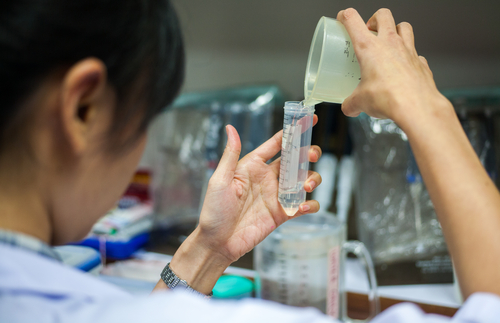Genkyotex Collects $21 Million to Fund NOX Inhibitors Research For IPF, Diabetic Nephropathy

 Genkyotex, a company developing selective NOX inhibitors for the treatment of chronic diseases, has completed a $21 million Series D round of financing. The proceeds from the financing will be invested in the company’s phase 2 trial to study GKT137831, a therapy for diabetic nephropathy, a progressive fibrotic disease, as well as idiopathic pulmonary fibrosis, and to advance other phase 1 trials and expand the pipeline of NOX inhibitors.
Genkyotex, a company developing selective NOX inhibitors for the treatment of chronic diseases, has completed a $21 million Series D round of financing. The proceeds from the financing will be invested in the company’s phase 2 trial to study GKT137831, a therapy for diabetic nephropathy, a progressive fibrotic disease, as well as idiopathic pulmonary fibrosis, and to advance other phase 1 trials and expand the pipeline of NOX inhibitors.
The financing was led by NeoMed Management, a new investor in Genkyotex, along with VI Partners and BioMedInvest, as announced in a press release. In addition, Edmond de Rothschild Investment Partners, Eclosion2 and Vesalius Biocapital Partners also participated in the business as major investors. Therefore, Claudio Nessi, PhD, from NeoMed will join Genkyotex’s Board.
“We have been very impressed with the progress made by Genkyotex, particularly in the clinical development of GKT137831,” Nessi said. “Genkyotex’s NOX inhibitors are a truly novel drug class with potential across many therapeutic areas, providing us with a compelling case for investment.”
“This financing ensures we can continue independent development of our lead drug GKT137831 through Phase 2 results and prepare for the next phase of trials,” stated the CEO of Genkyotex, Ursula Ney. “We are also now well positioned to advance other promising candidates into our NOX inhibitor pipeline.”
[adrotate group=”3″]
Genkyotex aims to present top-line results from its phase 2a trial regarding the study of the NOX1&4 inhibitor GKT137831 by the middle of this year. The inhibitors have already demonstrated in previous studies to have potential as therapy for difficult-to-treat fibrotic and inflammatory disorders of the kidney, liver, lung and skin.
Recent data reported by the company revealed GKT137831’s ability to reverse lung fibrosis related to aging in a new model of idiopathic pulmonary fibrosis (IPF). The company has previously conducted studies focused on age, as not only is the incidence of mortality and morbidity due to fibrotic diseases increasing, but aging is also an important risk factor as well.
“Our results provide preclinical data supporting the potential role for therapeutic agents that inhibit NOX4 for age-associated fibrotic disorders and provide new insights into redox mechanisms that control profibrotic effects of fibroblast senescence,” explained Victor J. Thannickal, MD, Professor of Medicine and Pathology, Director, Division of Pulmonary, Allergy, and Critical Care, University of Alabama (USA), who collaborated in the previous study. “Specifically, we were able to demonstrate that established fibrosis in lungs of aged mice is partially reversed by administration of GKT137831, a new NOX inhibitor from Genkyotex.”






